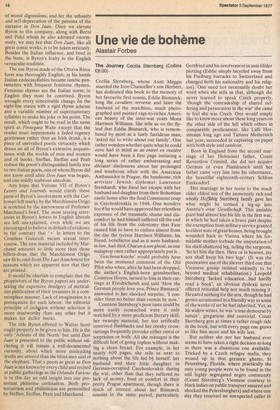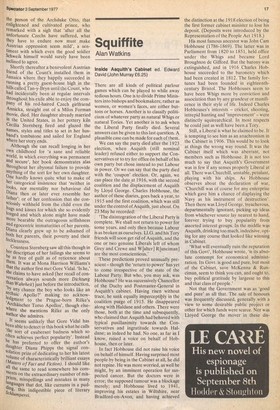Une vie de boheme
Alastair Forbes
The Journey Cecilia Sternberg (Collins. £8.00) Cecilia Sternberg, whose Aunt Maggie married the Iron Chancellor's son Herbert, has dedicated this book to the memory of her favourite first cousin, Eddie Bismarck, long the cavaliere servente and later the husband of the matchless, much photographed and painted rags-to-riches American beauty of the inter-war years Mona Harrison Williams. She tells us on the flyleaf that Eddie Bismarck, who is remembered by most as a fairly fastidious man, 'asked me to write about our family'. One rather wonders whether quite what he could nave had in mind as an entree en matiere would have been a first page initiating a long series of rather embarrassing and déclassé disclosures about her prolonged and tenebrous affair with the American Ambassador in Prague, the handsome, rich arriviste Jewish diplomat Lawrence Steinhardt, who fixed her escape with her husband and daughter from their Bohemian castle home after the final Communist coup in Czechoslovakia in 1948. One wonders too if he would have approved her relentless exposure of the traumatic shame and discomfort he had himself suffered till the end of his life from the colostomy that Fate caused him to have to endure almost from the day the tycoon Harrison Williams, his friend, benefactor and as it were husbandin-law, had died. Chacun a son ghoul, as one malaprop once rather appropriately put it.
'Geschmacksache' would probably have been the muttered comment of the Old Pilot who when, after he had been dropped, the author's English-born grandmother, . Countess Hoyos, turned to him in their carriage at Friedrichsruh and said 'How the German people love you, Prince Bismarck' answered to her shocked surprise, 'I consider them no better than vermin by now.'
Countess Sternberg's poor taste could be more easily stomached were it only matched by a more proficient literary skill; her swampy material, her too artifically contrived flashbacks and her creaky crosscuttings frequently provoke either ennui or scepticism or both. All she manages is the difficult feat of going topless without making a clean breast. For example, in her nearly 600 pages, she tells us next to nothing about the life led by herself, her husband and their little daughter in German-occupied Czechoslovakia during the war, other than that they suffered no lack of money, food or comfort in their pretty Prague apartment, though there is much of interest about her Bismarck cousins in the same period, particularly Gottfried and his involvement in anti-Hitler plotting (Eddie simply bicycled away from his Freiburg barracks to Switzerland and changed both his nationality and his religion). One need not necessarily doubt her word when she tells us that, although she never learned to speak Czech properly, `though the comradeship of shared suffering and persecution in the war' she came to feel she was Czech. One would simply like to know more about these long years on the other side of the hill which others in comparable predicament, like Lalli Horstmann long ago and Tatiana Metternich last year, succeeded in capturing on paper with both style and candour.
Born in England from the second marriage of her Holsteiner father, Count Reventlow Criminil, she did not acquire German or even Plattdeutsch until her father came very late into his inheritance, the beautiful eighteenth-century Schloss Emkendorf.
Her marriage in her teens to the much older eldest son of the immensely rich and wholly Hofftihig Sternberg family gave her what might be termed a leg-up into Austria's erste Gesellschaft. This amiable giant had almost lost his life in the first war, in which he had taken a brave part despite the exemption from military service granted to eldest sons of great houses, being brought wounded back to Vienna where his formidable mother forbade the amputation of his shell-shattered leg, telling the surgeons, 'So let him die then. Here or in heaven, my son shall keep his two legs'. (It was the procreative use of the shorter third one that , Viennese gossip insisted unkindly to be 1 beyond medical rehabilitation.) 'Leopold Sternberg 'lacked education.. .had hardly read a book', an obvious dyslexic never offered remedial help nor much missing it. He cared nothing for the arts, though he had grown accustomed in a friendly way to some of the works of art he had inherited. Yet, as his widow writes, he was 'a true democrat by nature', gregarious gnd convivial. Count Sternberg gets at times a rather rough ride in the book, but with every page one grows to like him more and his wife less.
But neither she nor her husband ever seems to have taken a right decision so long as there was a disastrous one available. Tricked by a Czech refugee mafia, they wound up in that geriatric ghetto, St Petersburg, Florida, where practically the only young people were to be found in the still highly segregated negro community (Count Sternberg's Viennese courtesy to black ladies on public transport amazed and shocked the Petersburghers) and where one day they received an unexpected caller in the person of the Archduke Otto, that enlightened and cultivated prince, who remarked with a sigh that 'after all the unfortunate Czechs have suffered, what they have to endure now must make Austrian oppression seem mild', a sentiment with which even the good soldier Schweik himself would surely have been inclined to agree.
Shortly thereafter a benevolent Austrian friend of the Count's installed them in Jamaica where they happily succeeded in running a pretty guest-house high in the hills called Tan-y-Bryn until the Count, who had incidentally been at regular intervals throughout his exile able to enjoy the comPany of his red-haired Czech girlfriend Annicka, straight out of .a Milos Forman movie, died. Her daughter already married in the United States, in her pottery kiln Cecilia Sternberg fired and glazed the names, styles and titles to set in her husband's tombstone and sailed for England Where her story ends. Although she can recall longing in her own childhood for 'a sane and reliable world, in which everything was permanent and secure', her book demonstrates alas throughout her abysmal failure to provide anything of the sort for her own daughter. One hardly knows quite what to make of her categorical insistence that 'neither in looks, nor mentality nor behaviour did Diana then or later ever resemble her father': or of her confession that she consciously withheld from the child even the hugs and kisses for which she so evidently longed and which alone might have made more bearable the outrageous selfishness and egocentric immaturities of her parents. Diana clearly grew up to be ashamed of both her parents, their poverty and their fecklessness.
Countess Sternberg saw all this though in her description of her failings she seems to be as free of guilt as of reticence about them. It was at Mona Harrison Williams's that the author first met Gore Vidal. 'Is he,' She claims to have asked (her recall of conversation always sounds more Dichtung thanWahrheit) just before the introduction, ‘bY any chance the boy who looks like an rchaic Apollo?' making no acknowledgment to the Prague-born Rilke's 'Archaischer Torso Apollos', though elsewhere she mentions Rilke as the only author she admires.
It seems unlikely that Gore Vidal has been able to detect in this book what he calls the sort of exuberant badness which so (Iften achieves perfect popularity'. Instead he has preferred to offer the author's daughter Diana Phipps the signal consolation prize of dedicating to her his latest voltime of characteristically brilliant essays (Matters of Fact and Fiction). I should like all the same to read somewhere his comments on the extraordinary number of misprints, misspellings and mistakes in many 1,a,flguages that dot, like currants in a pudthis indigestible piece of literary '3chlumperei.































 Previous page
Previous page